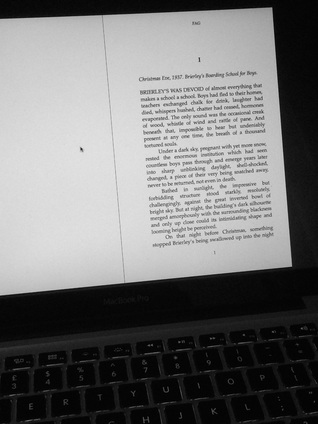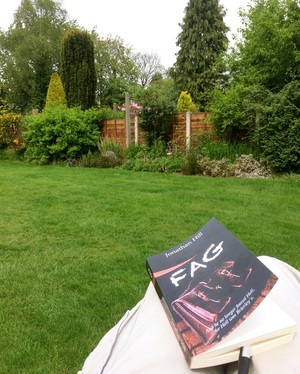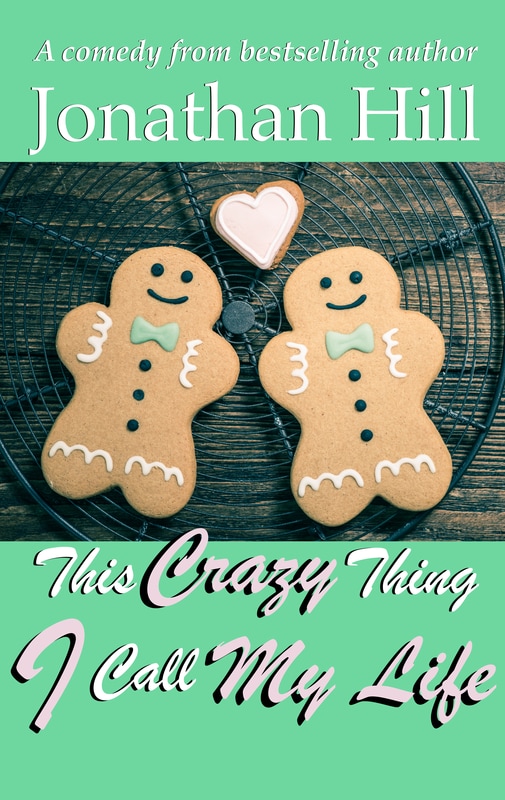I've been tagged by my fellow author and good friend, Kath Middleton, in a blog tour that aims to go beyond the stories authors write and discover how they write. While Kath and I have our individual writing styles and release our own distinct stories, we share a mutually beneficial partnership. We advise each other on the success of our stories and their impact as well as ironing out any niggling issues. You can read Kath's responses here.
1. What am I working on?
You don't get round me that easily! Once upon a time, I did reveal my releases way in advance. I now prefer to keep tight-lipped about anything I'm working on. However, I can say that I have two current projects on the go:
A new Maureen comedy that picks up from Maureen and The Big One, which I anticipate will again work as a stand-alone novella.
And my second novel, which is something very different and a challenge in terms of writing style. I cannot reveal anything more at this stage other than that I'm aiming for a real page-turner and, as with my first novel, FAG, it could again court controversy.
1. What am I working on?
You don't get round me that easily! Once upon a time, I did reveal my releases way in advance. I now prefer to keep tight-lipped about anything I'm working on. However, I can say that I have two current projects on the go:
A new Maureen comedy that picks up from Maureen and The Big One, which I anticipate will again work as a stand-alone novella.
And my second novel, which is something very different and a challenge in terms of writing style. I cannot reveal anything more at this stage other than that I'm aiming for a real page-turner and, as with my first novel, FAG, it could again court controversy.
2. How does my work differ from others in its genre?
If someone can tell me what genre I write in, I'd be delighted to try to answer this question! Thus far I have written two books of eclectic short stories, two books of 100-word stories (covering all genres), the humorous Maureen series of books and FAG, a boarding school thriller which explores bullying, prejudice and sexuality.
I like to think my writing has its own unique voice. I don't want to be pigeon-holed in a specific genre. I like to keep my readers on their toes. If I write drama, there'll be a twist. If I write comedy, you might well cry as well as laugh. I don't do straightforward emotions. Life is complex and that should be reflected in good writing.
3. Why do I write what I do?
I write what I want to write because if you try to write just for others and not for yourself, you quickly lose interest and struggle to inject passion into your books. I started to write as an escape. I suppose, although my Maureen books contain a lot of observational comedy, writing those is an escape from the stresses of life. (Although, I can't think of anything more stressful than living with a real Maureen.)
I should mention FAG again at this point. Writing that novel was more than just telling a story. It was a means of expressing deep feelings I hadn't previously expressed. It was a book I needed to write. And my future is all the brighter for it.
If someone can tell me what genre I write in, I'd be delighted to try to answer this question! Thus far I have written two books of eclectic short stories, two books of 100-word stories (covering all genres), the humorous Maureen series of books and FAG, a boarding school thriller which explores bullying, prejudice and sexuality.
I like to think my writing has its own unique voice. I don't want to be pigeon-holed in a specific genre. I like to keep my readers on their toes. If I write drama, there'll be a twist. If I write comedy, you might well cry as well as laugh. I don't do straightforward emotions. Life is complex and that should be reflected in good writing.
3. Why do I write what I do?
I write what I want to write because if you try to write just for others and not for yourself, you quickly lose interest and struggle to inject passion into your books. I started to write as an escape. I suppose, although my Maureen books contain a lot of observational comedy, writing those is an escape from the stresses of life. (Although, I can't think of anything more stressful than living with a real Maureen.)
I should mention FAG again at this point. Writing that novel was more than just telling a story. It was a means of expressing deep feelings I hadn't previously expressed. It was a book I needed to write. And my future is all the brighter for it.
4. How does my writing process work?
Good question. I'd like to provide a simple answer but my writing process varies according to what I'm writing, the mood I'm in and what time I have available. (Much of my time is spent at work/resting from work.)
My first draft probably differs from most first drafts in that it is far more polished than you might expect. I tidy and craft as I go and I like to think that very first draft is still readable. Kath kindly reads my chapters hot off my fingers and tells me her initial thoughts. Getting this instant feedback is terrifically encouraging and helpful as you see a reader's reaction in the very early stages. You can therefore tell what works, whether you're heading in the right direction and whether twists/jokes/dramatic points work as intended.
Further edits involve expanding, tweaking, tweaking and tweaking. I rarely scrap and rewrite sections in their entirety as I'm usually happy with my first draft's chapters, which I initially allow to form in my mind before I even write a word. That way I can visualise the characters and their situations and feel I'm living the story with them.
I don't plot the entire book before writing. Some people no doubt find a thorough plot essential, but I prefer to take a more natural approach. I write characters' stories and to some extent let them guide me. It's amazing how often twists and endings come upon you when you least expect it. This semi-planned approach makes my writing process dynamic, flexible and exciting.
Throughout the editing process, Kath is always on hand and I'm ever grateful for her patience, persistence and wise advice. You won't find many friends willing to read your book three or four times before it's even been published.
Who's next?
I'm passing on the baton to David Wailing, a real indie pro with much writing and editing experience. His futuristic thriller series, Auto, has established him as a master of the genre and he is currently showing off his editing and proofreading skills with his new business, Storywork.
Good question. I'd like to provide a simple answer but my writing process varies according to what I'm writing, the mood I'm in and what time I have available. (Much of my time is spent at work/resting from work.)
My first draft probably differs from most first drafts in that it is far more polished than you might expect. I tidy and craft as I go and I like to think that very first draft is still readable. Kath kindly reads my chapters hot off my fingers and tells me her initial thoughts. Getting this instant feedback is terrifically encouraging and helpful as you see a reader's reaction in the very early stages. You can therefore tell what works, whether you're heading in the right direction and whether twists/jokes/dramatic points work as intended.
Further edits involve expanding, tweaking, tweaking and tweaking. I rarely scrap and rewrite sections in their entirety as I'm usually happy with my first draft's chapters, which I initially allow to form in my mind before I even write a word. That way I can visualise the characters and their situations and feel I'm living the story with them.
I don't plot the entire book before writing. Some people no doubt find a thorough plot essential, but I prefer to take a more natural approach. I write characters' stories and to some extent let them guide me. It's amazing how often twists and endings come upon you when you least expect it. This semi-planned approach makes my writing process dynamic, flexible and exciting.
Throughout the editing process, Kath is always on hand and I'm ever grateful for her patience, persistence and wise advice. You won't find many friends willing to read your book three or four times before it's even been published.
Who's next?
I'm passing on the baton to David Wailing, a real indie pro with much writing and editing experience. His futuristic thriller series, Auto, has established him as a master of the genre and he is currently showing off his editing and proofreading skills with his new business, Storywork.




 RSS Feed
RSS Feed